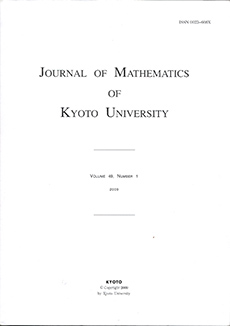Abstract
Let $I$ be an ideal in a Gorenstein local ring A with the maximal ideal $\mathfrak{m}$. Then $I$ is said to be an equimultiple good ideal if I contains a reduction $Q = (a_{1}, a_{2}, \ldots ,a_{s})$ generated by s elements in $A$ and if the associated graded ring $\mathrm{G}(I) = \bigoplus _{n\geq 0} I^{n}/I^{n+1}$ of $I$ is a Gorenstein ring with $\mathrm{a}(\mathrm{G}(I))=1-s$, where $s = \mathrm{ht}_{A}I$ and $\mathrm{a}(\mathrm{G}(I))$ denotes the $a$-invariant of $\mathrm{G}(I)$. The purpose is to explore the structure of the sets $\chi _{A,s}$ $(s\geq 0)$ of equimultiple good ideals I with $\mathrm{ht}_{A}I=s$. Goto, Iai and Watanabe [GIW] already studied $\mathfrak{m}$-primary good ideals $I$, that is the case where $\mathrm{ht}_{A}I = \dim A$. Some of their results are successfully generalized to those of equimultiple case with improvements.
Citation
Shiro Goto. Mee-Kyoung Kim. "Equimultiple good ideals." J. Math. Kyoto Univ. 42 (1) 21 - 32, 2002. https://doi.org/10.1215/kjm/1250284708
Information





